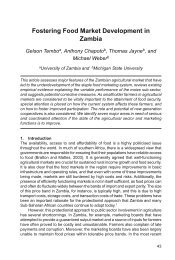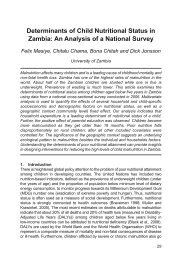Introduction to Basic Legal Citation - access-to-law home
Introduction to Basic Legal Citation - access-to-law home
Introduction to Basic Legal Citation - access-to-law home
Create successful ePaper yourself
Turn your PDF publications into a flip-book with our unique Google optimized e-Paper software.
[This order and all others of its vintage were withdrawn in 2005. See Me. Admin. Order, No.<br />
JB-05-01 (Aug. 1, 2005), http://www.courts.state.me.us/rules_adminorders/adminorders/JB-<br />
05-1.html. However, it continues <strong>to</strong> govern citation practice in Maine.]<br />
Note: See also University of Maine School of Law, Uniform Maine <strong>Citation</strong>s (2012 ed.),<br />
http://maine<strong>law</strong>.maine.edu/academics/pdf/UMC2012.pdf (which seeks <strong>to</strong> aid Maine<br />
practitioners in preparing legal briefs and memoranda, and Maine justices and judges in<br />
writing opinions, by providing a system of citation for the materials most frequently cited in<br />
the state).<br />
Maryland: Court of Appeals citation practice | <strong>Citation</strong> rule(s)<br />
Contents | Index | Help | < | ><br />
Examples from State Comm'n on Human Relations v. Talbot County Det. Ctr.,<br />
370 Md. 115, 803 A.2d 527 (2002)<br />
. . . .<br />
The Maryland Commission on Human Relations ("Commission") is an independent agency<br />
charged with investigating complaints of discrimination in employment, housing and public<br />
accommodations under Article 49B of the Maryland Code and bringing legal and equitable<br />
actions pertaining <strong>to</strong> those violations. See Md. Code (1957, 1998 Repl. Vol.), Art. 49B, § 10.<br />
. . . .<br />
The Detention Center, in its response dated July 3, 2001, asserted that the Circuit Court<br />
lacked subject matter jurisdiction over the Petition for Temporary Injunctive Relief. The<br />
Detention Center further alleged that the Commission's authority <strong>to</strong> investigate was limited <strong>to</strong><br />
the investigative mechanisms set forth in Title 14, Subtitle 3 of the Code of Maryland<br />
Regulations. Specifically, the Detention Center argued that the Commission is only allowed<br />
<strong>to</strong>: (1) require a fact-finding conference; (2) require the respondent <strong>to</strong> promptly provide<br />
answers <strong>to</strong> requests for information; (3) serve interroga<strong>to</strong>ries on a respondent; and (4) issue<br />
subpoenas, if necessary, <strong>to</strong> compel the attendance and testimony of witnesses or the<br />
production of documents. See COMAR 14.03.01.04. With respect <strong>to</strong> the latter, the Detention<br />
Center claimed that the use of the word "testimony" indicated that the Commission's<br />
interviews of the witnesses should be formal recorded proceedings, and thus the Commission<br />
had no authority <strong>to</strong> conduct interviews confidentially and in the absence of a representative<br />
from the Detention Center. 4<br />
. . . .<br />
Maryland's anti-discrimination <strong>law</strong>s are embodied in Article 49B of the Maryland Code, as is<br />
the Commission's investiga<strong>to</strong>ry and enforcement authority with respect <strong>to</strong> the antidiscrimination<br />
legislation. The Commission's comprehensive investiga<strong>to</strong>ry powers include the<br />
authority <strong>to</strong> hold investiga<strong>to</strong>ry hearings for fact finding, file civil actions for injunctive relief,<br />
192




